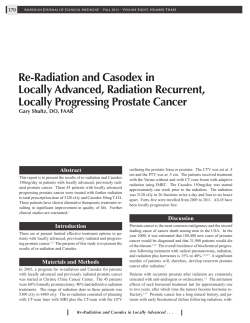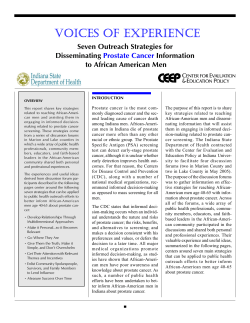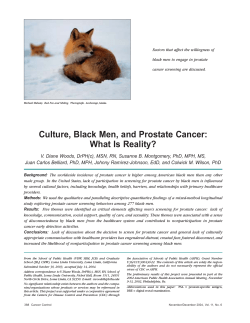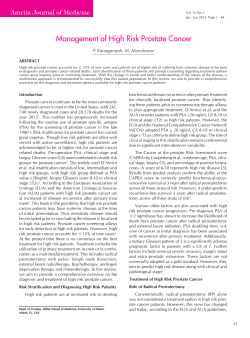
Dos & Don’ts
Educating African American Men: Dos & Don’ts Prostate Cancer Communication … Educating African-American men – Dos & Don’ts This booklet is developed as a resource for health care providers, health educators and researchers to assist them in communicating with African-American men about prostate cancer screening, clinical trials and treatment. 1 Educating African American Men: Dos & Don’ts This booklet is authored by Folakemi Odedina, PhD1; Nagi Kumar, PhD; John Scrivens, PhD and Clement K. Gwede, PhD based on the (i) community dialogue with African American men during the Florida State-wide African American men Prostate Cancer Forum2 and (ii) focus group discussions with African American men3. These projects were funded by the U.S. Army Department of Defense CDMRP Research Programs DAMD 17-01-1-0055 and W81XWH-04-1-0326. DISCLAIMER The information provided in this document is drawn from statements provided by African American men as a guide for prostate cancer education and are not endorsed by the U.S. Army Department of Defense, Florida A&M University or The H Lee. Moffitt Cancer Center & Research Institute. 1 Corresponding author. Florida A&M University Center for Minority Prostate Cancer, Suite 200 Dyson Pharmacy Building, Tallahassee Fl 32307; (850) 599-3097 (Phone). 2 The African American Men’s Prostate Cancer Forum. Presented by Florida A&M University Center for Minority Prostate Cancer Training and Research, Tallahassee, Florida. September 1718, 2004. 3 Odedina FT., Scrivens J., Emanuel A., LaRose-Pierre M, Brown J., Nash R. (2004). A naturalistic study of factors influencing African American men’s prostate cancer screening behavior. Journal of National Medical Association. Jun; 96(6):780-8. 2 Educating African American Men: Dos & Don’ts One of the two goals specified for the United States Healthy People 2010 is to eliminate health disparities among segments of the population. This goal is very crucial to the overall health of the nation. Consequently, to eliminate cancer as a major health problem within the U.S., it is important to address cancer disparities within the population. African-Americans carry the most significant burden for cancer in the U.S. This burden is especially heavy for African American men in the case of prostate cancer. Although prostate cancer affects men regardless of their racial group, a disproportionate burden is experienced by African-American men. From the American Cancer Society’s 2005 statistics, African American men are 2.4 times more likely to die of prostate cancer compared with White men. They also have the highest incidence of prostate cancer compared to other racial/ethnic groups in the United States. Some of the reasons that have been noted in the literature for the prostate cancer disparity seen in the African-American population, include the fact that (i) African-American men do not have adequate knowledge about prostate cancer disease, including basic components of prostate screening; (ii) they are less likely to correctly identify early symptoms of prostate cancer; (iii) they are more likely to believe pain is the first symptom of prostate cancer; (iv) they do not know that their race makes them a high-risk group; (v) they have a poor prostate cancer survival rate; (vi) they are more likely to present at a later stage of prostate cancer; (vii) they have higher levels of prostatespecific antigen and (viii) prostate tumors appear to be more aggressive in African-American men. Since there is no recognizable symptom for early prostate cancer, informed decisions should be promoted in at-risk men, especially African-American men, so that aggressive treatment can be provided to increase their survival rate. This booklet is developed as a resource for health care providers, health educators and researchers to assist them in communicating with African-American men about prostate cancer screening, clinical trials and treatment. This content is a summary of the direct statements made by African American men to describe the best and worst methods for communicating on prostate cancer issues. 3 Educating African American Men: Dos & Don’ts What do African-American men want you to do to address prostate cancer disparities? DO…. 9 Encourage more doctors to conduct PSA tests. 9 Encourage more people younger than 50 to get PSA tests. 9 Develop a web site for prostate and colon cancer. 9 Send e-mail bulletins to Black organizations for distribution to their members. 9 Develop short fact sheets for distribution through Black organizations at least twice a year. 9 Tie prostate cancer forums or seminars in with other activities such as sports events. 9 Hold frequent educational forums to educate the community and promote awareness. 9 Educate more often on prevention activities such as diet, smoking, drinking etc. 9 Encourage annual screening/checkup. 9 Tailor messages to different age groups and communities. 9 Clarify myths and misunderstandings about prostate cancer. 9 Only give messages relevant to the Black community. 9 Provide all the issues in lay terms. 4 Educating African American Men: Dos & Don’ts What do African-American men want to hear from you about prostate cancer? DO …. 9 9 9 9 9 9 9 9 9 9 9 9 9 9 9 9 9 9 9 9 Explain the need for a prostate exam. Discuss how it will affect a man’s life. Talk about how sex life is affected with prostate cancer Discuss the chance of surviving prostate cancer. Talk about the role of diet, nutrition and physical activities. Advice on how to fit exercise into one’s busy schedule. Explain the risk factors for “African” males. Explain about high-risk activities/exposures. Talk about scientific findings in this area. Discuss the positive outcomes and negative outcomes of getting screened. Provide good information about the screening procedure. Give shocking statistics about prostate cancer. Provide statistics supporting screening early and regularly. Give information about people who have prostate cancer, especially if they survived. Provide information about where to go and how to get to the medical services. State if one can get prostate cancer regardless of heredity. Discuss the seriousness of the disease. Talk about signs and symptoms of the disease. Provide information about the cure for the disease. Provide information about the risk and mortality differences in other Black men of African descent. 5 Educating African American Men: Dos & Don’ts In providing prostate cancer information to AfricanAmerican men: DO use channels such as …. 9 9 9 9 9 9 9 9 9 9 9 9 9 9 9 9 9 9 9 9 9 9 9 Internet Television Billboard Flyers Church Personal contact Word of mouth Community outreach Street contact in Black neighborhoods Black radio stations Gospel stations which target the age group of interest Black magazines such as Ebony Black Television stations such as BET Black hair salons Black barber shops Schools (sending information home through children) Books Sports events ads Advertisements at job sites Goodyear Blimp Messages in payroll check Messages in utility bill Advertisements during big sporting events 6 Educating African American Men: Dos & Don’ts In providing prostate cancer information to AfricanAmerican men: DO use sources such as …. 9 9 9 9 9 9 9 9 9 9 9 9 9 9 9 9 9 9 9 9 9 9 9 Friends Family, such as parents, children and siblings Wife – most important Prostate cancer survivors Doctor Nurse Specialists who provide second opinions Knowledgeable and reputable Black doctors Black men Black community organizations such as Black Caucus, NAACP, Urban League Well known high profile black man who has prostate cancer and will go public Pharmaceutical companies National Cancer Association Centers for Disease Control and Prevention Children God Ministers Friends who are health care providers Black colleges such as Florida A&M University (with a mission to serve the black community) Personal doctor Specialist Research team Urologist 7 Educating African American Men: Dos & Don’ts In providing prostate cancer information to African American men: DO NOT use sources such as …. ⊗ Non African-American physicians. ⊗ Physician with bad attitude. ⊗ White physician (African-American men believe that Whites are not concerned about Blacks; may not provide all information; may not know enough about Blacks to provide relevant information). ⊗ Family and friends who are not knowledgeable. ⊗ Someone with no knowledge on prostate cancer. ⊗ Prison doctors. ⊗ Non-health care providers. ⊗ Drug companies. ⊗ Law makers, politicians. ⊗ A doctor who rushes patients in and out. ⊗ A doctor who doesn't refer patients to a specialist. ⊗ A person who has never been tested for prostate cancer. 8 Educating African American Men: Dos & Don’ts To properly educate prostate cancer: African-American men about DO NOT …. ⊗ Keep any information away. ⊗ Act as if it is not important. ⊗ Be dishonest about negative effects of testing, treatment and clinical trials. ⊗ Speak in very technical medical terms. ⊗ Give false information. ⊗ Use messages that are not culturally sensitive. ⊗ Provide information downplaying causes and effects of prostate cancer ⊗ Discuss information specifying ineffective treatment if diagnosed. ⊗ Use a message that may indicate that this is another part of the long list of things attributed to the Black race. ⊗ Use negative media image of the disease that scares people. ⊗ Include too much medical jargon in your message. ⊗ Use messages that are too long, for example having to read about 15 pages of information. ⊗ Use messages such as “If you have prostate cancer, you will die”. ⊗ Include messages about the rectal exam that causes fear, embarrassment or stigma of homosexuality. 9 Educating African American Men: Dos & Don’ts What other resources / opportunities will assist African-American men in making informed decisions about prostate cancer screening? 9 Other health promotion / disease prevention activities. e.g. other health screening activities 9 Testing required by employer (part of job requirement) 9 Easier procedure for testing, e.g. blood test rather than rectum 9 Knowledge of the seriousness of disease among African Americans 9 Knowledge of the disease and screening 9 Self interest in screening 9 Ability to ask health care providers the right questions 9 Awareness / Education 9 Reading about the disease, educating oneself 9 Having health insurance 9 Money to see the doctor 9 Free screening 9 Giving incentives for screening 9 Prior contact - knowing somebody who was diagnosed with prostate cancer 9 In an environment that the individual grew up which will influence health consciousness 9 Access to health care 9 Availability of testing 9 Transportation Regular check ups Screening mandated as part of annual physicals Knowing the probability of getting prostate cancer Being health conscious Reminders from doctors Fear of getting prostate cancer Perceived consequences of getting prostate cancer Knowledge of what will happen if you don't get screened Realizing how deadly the disease could be Living in a health conscious environment Having the signs and symptoms Fear of premature death Desire to know if you have it or not Knowing the benefits of getting checked Knowing that you are still in good shape Get the message about screening early Black neighborhoods have medical team in a van giving free screening 9 Noting that prostate cancer can run in families 9 Knowing one's own family history 9 Showing how prostate cancer can affect loved ones 9 9 9 9 9 9 9 9 9 9 9 9 9 9 9 9 9 10 Educating African American Men: Dos & Don’ts What are the things that may serve as obstacles for African-American men in making informed decisions about prostate cancer screening? ⊗ ⊗ ⊗ ⊗ ⊗ ⊗ ⊗ ⊗ ⊗ ⊗ ⊗ ⊗ ⊗ ⊗ ⊗ ⊗ ⊗ ⊗ ⊗ ⊗ ⊗ ⊗ Lack of family history gives false sense of not being at risk Scared of finding out the results Fear of the disease Impact on sex life Discomfort of testing and being violated by the rectal exam Doctor not willing to answer questions Lack of awareness or knowledge Black men having limited contact with the health care system Black men not seeing doctor regularly Pattern/history of Parent(s) health promotion/prevention activities Not comfortable sharing personal information with doctors Not trusting the procedure Not trusting the doctor or the health care system Unhelpful doctor Unable to read (illiteracy might make you feel uncomfortable communicating with health care providers) Individual perception about testing or the disease Preventing yourself from worrying (may not want to know so that you don't have to worry) Denial of your susceptibility Knowing that African- American men are often noted to be at risk for many things - out of your control Lack of self motivation Ignorance Time constraints ⊗ ⊗ ⊗ ⊗ ⊗ ⊗ ⊗ ⊗ ⊗ ⊗ ⊗ ⊗ ⊗ ⊗ ⊗ ⊗ ⊗ ⊗ ⊗ ⊗ ⊗ Not wanting "to be too white" by being very health conscious Not having a black doctor Not having a primary physician Priorities (e.g. more worried about providing food and accommodation to the family, health has lower and not immediate priority) Black male syndrome (unmanly to complain) No health discussion among black men Negative results from previous health screening Lack of information from doctor Diversions such as drinking, drugs Having other disease / Being sick Lack of money Unable to take time off work for testing Fearing a doctor with large hands for the Digital Rectal Exam Lack of access to healthcare / healthcare facilities Being complacent Not taking advantage of opportunities such as the free screening Services mostly provided by white men (no trust in whites providing the services) Other competing focus - such as paying rent, putting food on the table etc. Being too proud to admit you can't afford the test Fear of needles Fear of positive test result 11 Educating African American Men: Dos & Don’ts 12
© Copyright 2025





















